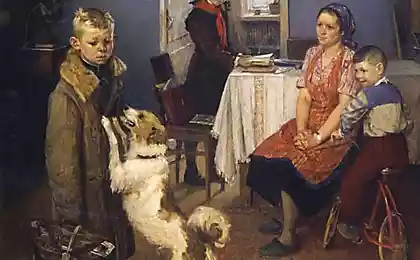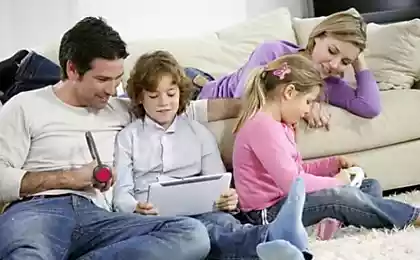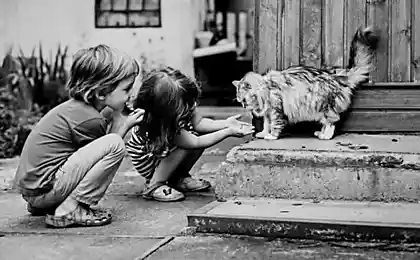1108
Why adult children don't respect their parents
The respect of children to parents and elders is the most important of the seven virtues. "Honor your father and mother..." (remember?). If the child does not respect and love their parents, it is similar to a young tree that has no roots, or a Creek that has no more source.
Parents gave us life. It's hard to describe what efforts they made to grow us what we are.
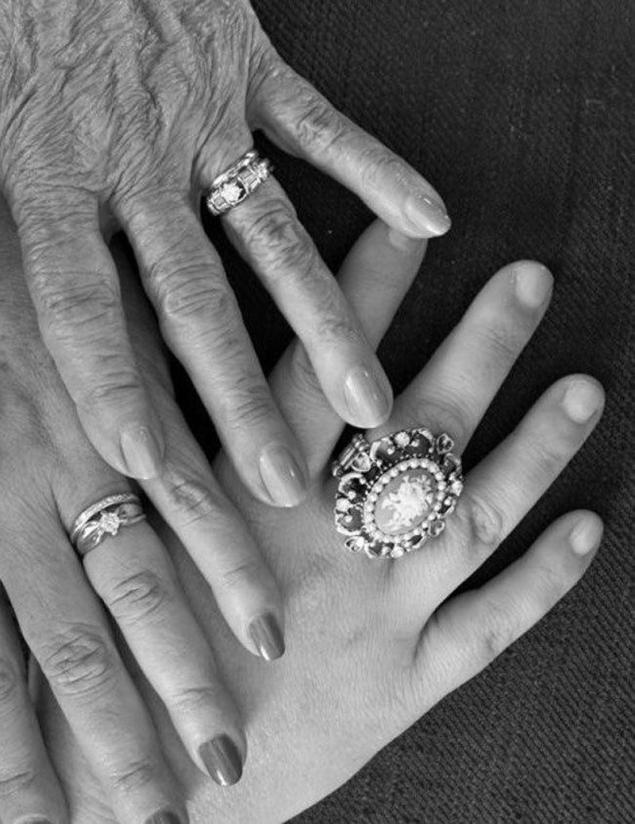
What do parents expect in return? They need attention, care, ideally, love but above all respect(thus, the child shows his gratitude).
View the meaning of the word "respect":
Respect is a feeling of esteem, attitude that is based on merit, high qualities of someone or something. // The recognition of the importance, significance, value; high estimate.
Now think, how many we see families happily came to relationships between adults (adults!) children and their parents?
That's how people
You want it, do not want,
But only the parents love children
Little more than children their parents.
Parents this has always, I confess,
It's a shame and strange. And yet, and yet,
It is not necessary here apparently wonder
And no need to take offense too.
Love's not Laurus under curly tabernacles.
And feels in life the sharper,
Who donates, valid, gives,
In short: giving, not taking.
Infinitely loving their children,
Parents love not only them,
But more than that, they were invested:
Tenderness, caring, the works,
With adversity winning battles,
And just to give even the impossible!
And the children, adopting a fatherly labour
And becoming mustache "children",
As a tribute all take
And patronizingly call
Parents "old people" and "ancestors."
When they gently chided,
Reminding about the labor community,
Children parents say:
— Don't need comrades, sad rants!
Less complaints, more courage!
That's how people
You want it, do not want,
But only the parents love children
Little more than children their parents.
And yet it is not necessary children are to blame.
Because they do not age Twitter on the branches.
Once they kids grow,
All perechuvstvovat, experience
And visit the "elders" and "ancestors"!
Eduard Asadov
Why is this happening? When begins the Era of the great unlove?
Most often, parents love their young children (especially if they're naughty) and they reciprocate. Even if it's not the way most parents never admit their dislike of children (even yourself). They patiently try to meet their needs. But, let's think about what needs talking about?
Most often, their concern for the satisfaction of physiological (food, etc.) needs and security needs. Already with a need for love, many problems arise. Love is replaced by hyperopia. Excessive concern does not give the child the opportunity to develop, because the development, as we know, may be only at the level of overcoming.
"The child is not a plant, it cannot grow in the greenhouse, under the hood its influence" (A. Sorin).
Thus, children are deprived of the opportunity to learn to trust yourself, grow with the belief that nothing depends on them. Often these relationships become suffocating for the kids, and there are two choices – revolt and humility.
Well, if the child rebels. Worse, if used.
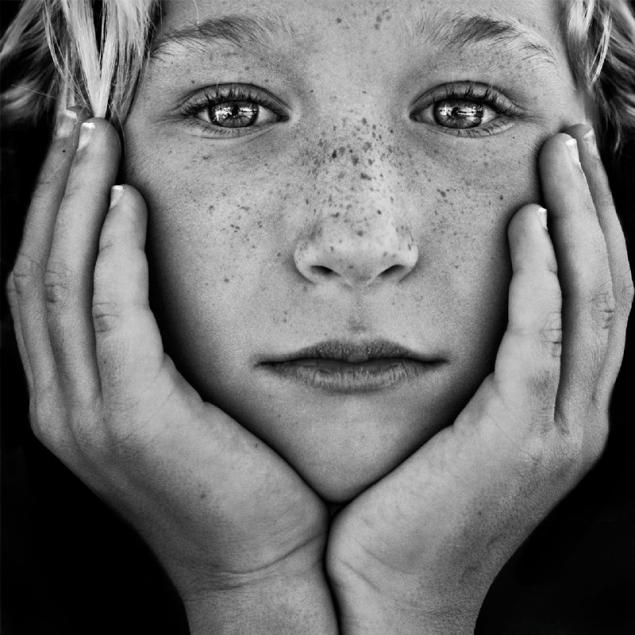
In the latter case, parents are forever taking responsibility for the lives of their children. But the more responsibility we take for your child, the less responsibility it is. Thus, we infantilizing it and reload itself. No one knows exactly at what age we can assume that parents are "completely innocent" and whether such ever. So they feel a lifelong responsibility for everything done by their children. So someone, instead of the child (FOR him) takes on the function of control over it. Why would the child to develop this skill at home?
Lamarck, already in the 18th century said: "Unused function atrophies or dystrophies". And the farther the worse... a Small child is easy to control, but children grow up. And the less opportunities for parents to participate directly in the lives of children, the more their anxiety due to the feeling of the inability to "fly" their flight (because they, and only they are responsible for the result!), and the greater the desire to criticize and prohibit – as an attempt to regain control. It turns out that in most cases, when children expect parents ' support in its formation, the parents hinder them more than help to develop. The child grows into an adult who does not have an adequate understanding of your own capabilities and does not feel responsible for their lives.
What is the future for the parents of such children?
"All the best for the children until their old age? Children grow, surpassing the income of their parents?" G. Malkin
And need not then be surprised that parents are so hard, but others in their surroundings or to what is not the case! You think the kids feel such gratitude to parents? No way.What is easily given, typically, little appreciated, if not noticed.
Conclusion: it is Not necessary to take all the responsibility, only need to take your own!
Why do parents seek to control their child? Then, they consider it an extension of yourself... You're in control of your arm or leg? So for many parents this is a strange question. And what about the needs of higher level? And in any way. Can we say that the parents respect their children? Understand and appreciate their personality? "What nonsense" — with indignation, say many parents. For that they respected? Adults we respect for the achievements of their children there..." (Oh you)
A lot of real warmth and understanding of the interests of the child in similar ways? So, parents (at best) like children as part of themselves... and all... Respect for individuality in this system is not in principle.
What is the result?
Basic lack of respect for personality in children (personality and undoubtedly is) usually extends further. Actually, in this lies one of the main causes of conflict between generations. Children grow up, but parents continue to consider them their property, unceremoniously invading their privacy.
What are the boundaries? Many parents in principle have no concept of personal space.
How is their communication? As a rule, on the principle of "mommy (daddy) knows best what you need". But as they grow older children, the mother is also gaining more life experience and so, again, knows better.
Parents try to instill in their children habits and Outlook on life. Im hurt by the fact that children are not quite what they want to see them, so they ruthlessly eradicate any dissent and difference, like a weed. Of course, out of good intentions (so they think). They genuinely try to protect their children from mistakes. That's just the way? As a rule, by a constant search for gaps and instructions on them... so they turn them into losers, both in their own eyes and in the eyes of the parents. "Good intentions pave the road to hell"...
If a parent believes that the child continued, improved copy, the child inevitably becomes a hostage to parental ambitions, complexes, an instrument for settling scores with other people and to the world at large. He "needs" to meet the expectations of parents to achieve what they could not, to correct in their minds a way of life, etc. In fact, we again are dealing with the disrespect to the person of another, with the denial of his right to decide how to live. "Give parents a little confidence, and they will use them as scrap to cut you open and rearrange your life, depriving her of any prospects"(Douglas Coupland) And "against scrap no reception"...
Parental vanity is able how to help your child is to support in achieving results in their own way and after bringing a justified sense of pride for him, and seriously complicate life.
Scenario in this scenario can develop in several ways:
1. The successful implementation of the prescribed scenario with great effort, giving the same parents proud kid, but contrary to its true interests. In this case the son / daughter.
2. The frustration of parents about the failure of the life of the son (daughter) who either failed to realize the prescribed parents scenario because of the lack of aptitudes, either did not attempt this. In this situation suffer from both parents, most likely, and their children. The realization that disappoint loved ones – moreover, the parents (the first and usually most important figures in the life of any human being) – can be an unbearable burden.
3. Success against the wishes of the parents, possibly the implementation of antistenai. With this scheme, even if a person's life is successful with it, and with the generally accepted points of view, parental pride does not have any grounds. After all, success is achieved not because but in spite of the parents and, in fact, serves as a refutation of their own beliefs, values, and ultimately, their entire life experience (i.e. life in General). This scenario is sometimes favorable for the child, its looks, but typically not for the parents.
Remember: any script (even a straight line, though "antistenai") is a rigid scheme that limits the flexibility, mobility, adaptability of the individual. If the desire to refute the scenario prescribed by parents, begins to define a person's life, it can make it as far from its Central task of self-realization – as a submissive following of their own.
The main task of parents is to create conditions in which the child will gradually learn to rely on themselves, to access their own resources and to develop the ability to meet their needs. The main distinctive sign of a good parent — he sees the child as a person (personality) instead of "material" from which you can "sculpt" everything the parent sees fit.
Unfortunately, many parents can not think that the joy for the success of children and the recognition of their independence in achieving it and simply respect their individuality can also be a contribution to the children creating their own unique life.
As for the main tools of the educational process – criticism and indication of errors, "as you sow, so shall you reap".
Parable:
"One day the wise man came.
— You are wise! Help me! I feel bad. My daughter doesn't understand me. She can't hear me. She's not talking to me. It is cruel. Why her heart?
The sage said:
— When you get home, write a portrait of her, take his daughter and silently give it to her.
The next day to the sage burst into an angry man, and exclaimed:
— Why did you tell me yesterday to do this stupid act!? Was bad. But it got worse! She gave me a drawing, full of indignation!
— What did she say to you? — asked the sage.
— She said, "Why did you tell me this? What more do you need mirrors?"
The main thing that children inherit from their parents is the habit to criticize. The children grew up as they are near them. Evaluate and criticize, knowing "how", "how" to be a parent. A parent in General and ours in particular. Once their parents told them what it means to be a "good" child, now it is their turn. Because the parents think it is possible to compare children with someone else (the vast majority of cases are not in their favor). Then why are they surprised that adult children compared to parents with someone? Someone who achieved more and gave their children more? "Respect? In that respect my parents, an adult child asks – "What an idiot" Adults we respect achievements, my parents have them there..." (familiar phrase, huh?).
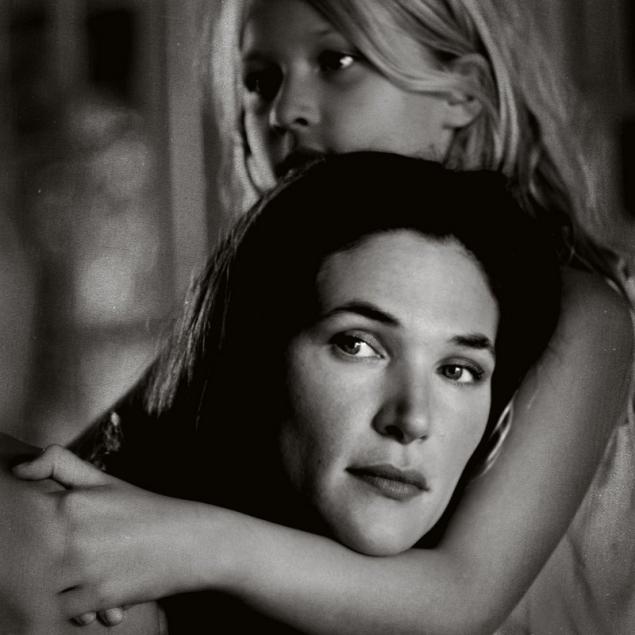
Criticizing, raising only critics. Himself criticize, but in response I just want appreciation and respect? But, where children learn, if parents they only make comments, thereby firmly implanted in his head the idea that they are losers and all they do is not good enough?
We are involved in a circular process of disrespect.To educate the child respect if you yourself do NOT RESPECT others. What about the parents with respect for other people? For example, their parents? "What you'll do for their parents, and expects the same from children" (Pitak).
Respect, gratitude and recognition of the achievements too, should be taught, preferably by example. "And as want that with you people acted, and you act with them" (LK. 6: 31).
Parable:
"One man went to the store and to his surprise saw that the counter is God Himself.
Having rumpled, the visitor decided to come and asked:
— What do You sell?
— What does your heart desire? – God said.
Without thinking, the buyer answered:
I want happiness, peace of mind and freedom from fear... for myself and for everyone else.
To this God said:
— It is possible. But I'm not here to sell fruit. Only seeds".
Adult children still need feedback, advice, assistance and approval of parents. You can argue how much (it depends on whether the parent is still the authority) but it is safe to say that they need support much more than the criticism, negative comments and negative assessments. Children (at any age) it is very important to get confirmation of success, achievements, successful development of new social roles.
Why do parents not understand this? Why do so many criticize and blame?
1. Parents carry children on your own experience, creating an atmosphere of education through criticism, which brought up themselves.
2. Parents assess children's achievements, comparing them with how to relate to their own achievements. And if they consider themselves losers, that it's hard to admit the success of their children. Anyone who does not respect himself is not able to respect others. Unfortunately, it is often possible to observe how the assertion of one is through the search for defects or depreciation of others. Sometimes it happens unconsciously, intuitively and habitually, and sometimes even emphasized as a leading principle of life: "Mistakes are necessary to find in order to get rid of them".
3. Children often go through in which parents themselves (the parent script). Admonishing and scolding children, they are actually criticizing themselves in the past" (N. Manukhina).
The most important thing to understand in time that the children are grown. Otherwise kids remains nothing how to pull away from their parents or even get rid of them, like the old ballast, traveled somewhere far away. What kind of respect and gratitude...
The basis of the requirements of respect for parents is the idea that an older person deserves respect because he is older ("We have lived life! Will get to be my age...").
However, isn't as cruel as it sounds, in theory, the older man worthy of respect:
"Parents and teachers is primarily giving, children and students – taker. However, parents also receive something from their children, and teachers from their students. But balance it does not recover, and only diminished by his absence. But the parents themselves were once children, and teachers – students. Your debt they repay, passing to the next generation what we got from the previous one. And the same opportunity to have their children and students"(Hellinger B. I.)
In fact, do wrong to consider this process as repossession. It's impossible to repay for life, which gave us parents. Such a debt can never be "settled." And the requirement to return it is the protest of the children: "I owe you nothing", "Raising me you were just doing your parental duty" (and for many children: "the Parent debt will continue to grow as redemption" (G. Malkin), "I have not asked to be born". If life and care about us is debt, it can be returned only to those who have taken. This view stops the flow of life, giving rise to children, guilt, despair and anger, and parents who "threw", not restoring what is borrowed, a sense of meaninglessness of life lived.
Can you fix such a relationship? The vast majority of you (would wish). How? Dare to engage in dialogue. To understand the mutual expectations (because they are not always obvious to the other side!). Express your feelings, because where there is such hatred, is bound to have and love. Just mutual insults do not allow her to "come out" as gravestone block access to freedom from recrimination, criticism, discontent. Those parents who sincerely rejoice in the accomplishments of their children, are always needed and welcome for them. Their children recognize that a lot of good and useful they were taught by their parents.
The recognition of other makes free himself. And then there is the joy of communication. And words of acceptance, of gratitude to each other (just each other). But how will this fellowship you can always negotiate. As an "adult" with "adult." Because normal parents do not live only for the children, but their lives, they have their own interests, build relationships with many people. Do not keep all the "savings" (deposits) in one Bank...
The conflict of "fathers and children" is eternal. Every society is a system of interaction between age of layers and its development is a succession and the succession of generations, which is always selective: some knowledge, norms and values are absorbed and transmitted to future generations, others that are not relevant to the changed conditions, rejected or transformirovalsya.
Parents and children look at the world from different points of view. Children want change, the parents have impeded progress, caused children to transition from the old to the new went smoothly. "The young think old people are stupid, but old men know young fools!" (Agatha Christie). It is important not to forget about mutual respect (which is mutual, and not hide behind the phrase "the egg teaches the hen"), recognize the right to dissent.
So who should start moving forward (if there is a desire to establish a relationship)? Children or parents?
The wiser.
If it's the parents, not whether they should first take a step towards the children? If it's children, then isn't it time to stop building walls and start building bridges? But in most cases, they believe that their business demand (love, care, respect, gratitude). Requirements-a road to nowhere. So maybe it's time to change direction (go from phone to each other for movement "to")? And if not, go to therapy, where the specialist not involved in the family "showdown", will help to establish contact... posted
Author: Tina Ulasevich
P. S. And remember, just changing your mind - together we change the world! ©
Source: www.b17.ru/article/7437/
Parents gave us life. It's hard to describe what efforts they made to grow us what we are.

What do parents expect in return? They need attention, care, ideally, love but above all respect(thus, the child shows his gratitude).
View the meaning of the word "respect":
Respect is a feeling of esteem, attitude that is based on merit, high qualities of someone or something. // The recognition of the importance, significance, value; high estimate.
Now think, how many we see families happily came to relationships between adults (adults!) children and their parents?
That's how people
You want it, do not want,
But only the parents love children
Little more than children their parents.
Parents this has always, I confess,
It's a shame and strange. And yet, and yet,
It is not necessary here apparently wonder
And no need to take offense too.
Love's not Laurus under curly tabernacles.
And feels in life the sharper,
Who donates, valid, gives,
In short: giving, not taking.
Infinitely loving their children,
Parents love not only them,
But more than that, they were invested:
Tenderness, caring, the works,
With adversity winning battles,
And just to give even the impossible!
And the children, adopting a fatherly labour
And becoming mustache "children",
As a tribute all take
And patronizingly call
Parents "old people" and "ancestors."
When they gently chided,
Reminding about the labor community,
Children parents say:
— Don't need comrades, sad rants!
Less complaints, more courage!
That's how people
You want it, do not want,
But only the parents love children
Little more than children their parents.
And yet it is not necessary children are to blame.
Because they do not age Twitter on the branches.
Once they kids grow,
All perechuvstvovat, experience
And visit the "elders" and "ancestors"!
Eduard Asadov
Why is this happening? When begins the Era of the great unlove?
Most often, parents love their young children (especially if they're naughty) and they reciprocate. Even if it's not the way most parents never admit their dislike of children (even yourself). They patiently try to meet their needs. But, let's think about what needs talking about?
Most often, their concern for the satisfaction of physiological (food, etc.) needs and security needs. Already with a need for love, many problems arise. Love is replaced by hyperopia. Excessive concern does not give the child the opportunity to develop, because the development, as we know, may be only at the level of overcoming.
"The child is not a plant, it cannot grow in the greenhouse, under the hood its influence" (A. Sorin).
Thus, children are deprived of the opportunity to learn to trust yourself, grow with the belief that nothing depends on them. Often these relationships become suffocating for the kids, and there are two choices – revolt and humility.
Well, if the child rebels. Worse, if used.

In the latter case, parents are forever taking responsibility for the lives of their children. But the more responsibility we take for your child, the less responsibility it is. Thus, we infantilizing it and reload itself. No one knows exactly at what age we can assume that parents are "completely innocent" and whether such ever. So they feel a lifelong responsibility for everything done by their children. So someone, instead of the child (FOR him) takes on the function of control over it. Why would the child to develop this skill at home?
Lamarck, already in the 18th century said: "Unused function atrophies or dystrophies". And the farther the worse... a Small child is easy to control, but children grow up. And the less opportunities for parents to participate directly in the lives of children, the more their anxiety due to the feeling of the inability to "fly" their flight (because they, and only they are responsible for the result!), and the greater the desire to criticize and prohibit – as an attempt to regain control. It turns out that in most cases, when children expect parents ' support in its formation, the parents hinder them more than help to develop. The child grows into an adult who does not have an adequate understanding of your own capabilities and does not feel responsible for their lives.
What is the future for the parents of such children?
"All the best for the children until their old age? Children grow, surpassing the income of their parents?" G. Malkin
And need not then be surprised that parents are so hard, but others in their surroundings or to what is not the case! You think the kids feel such gratitude to parents? No way.What is easily given, typically, little appreciated, if not noticed.
Conclusion: it is Not necessary to take all the responsibility, only need to take your own!
Why do parents seek to control their child? Then, they consider it an extension of yourself... You're in control of your arm or leg? So for many parents this is a strange question. And what about the needs of higher level? And in any way. Can we say that the parents respect their children? Understand and appreciate their personality? "What nonsense" — with indignation, say many parents. For that they respected? Adults we respect for the achievements of their children there..." (Oh you)
A lot of real warmth and understanding of the interests of the child in similar ways? So, parents (at best) like children as part of themselves... and all... Respect for individuality in this system is not in principle.
What is the result?
Basic lack of respect for personality in children (personality and undoubtedly is) usually extends further. Actually, in this lies one of the main causes of conflict between generations. Children grow up, but parents continue to consider them their property, unceremoniously invading their privacy.
What are the boundaries? Many parents in principle have no concept of personal space.
How is their communication? As a rule, on the principle of "mommy (daddy) knows best what you need". But as they grow older children, the mother is also gaining more life experience and so, again, knows better.
Parents try to instill in their children habits and Outlook on life. Im hurt by the fact that children are not quite what they want to see them, so they ruthlessly eradicate any dissent and difference, like a weed. Of course, out of good intentions (so they think). They genuinely try to protect their children from mistakes. That's just the way? As a rule, by a constant search for gaps and instructions on them... so they turn them into losers, both in their own eyes and in the eyes of the parents. "Good intentions pave the road to hell"...
If a parent believes that the child continued, improved copy, the child inevitably becomes a hostage to parental ambitions, complexes, an instrument for settling scores with other people and to the world at large. He "needs" to meet the expectations of parents to achieve what they could not, to correct in their minds a way of life, etc. In fact, we again are dealing with the disrespect to the person of another, with the denial of his right to decide how to live. "Give parents a little confidence, and they will use them as scrap to cut you open and rearrange your life, depriving her of any prospects"(Douglas Coupland) And "against scrap no reception"...
Parental vanity is able how to help your child is to support in achieving results in their own way and after bringing a justified sense of pride for him, and seriously complicate life.
Scenario in this scenario can develop in several ways:
1. The successful implementation of the prescribed scenario with great effort, giving the same parents proud kid, but contrary to its true interests. In this case the son / daughter.
2. The frustration of parents about the failure of the life of the son (daughter) who either failed to realize the prescribed parents scenario because of the lack of aptitudes, either did not attempt this. In this situation suffer from both parents, most likely, and their children. The realization that disappoint loved ones – moreover, the parents (the first and usually most important figures in the life of any human being) – can be an unbearable burden.
3. Success against the wishes of the parents, possibly the implementation of antistenai. With this scheme, even if a person's life is successful with it, and with the generally accepted points of view, parental pride does not have any grounds. After all, success is achieved not because but in spite of the parents and, in fact, serves as a refutation of their own beliefs, values, and ultimately, their entire life experience (i.e. life in General). This scenario is sometimes favorable for the child, its looks, but typically not for the parents.
Remember: any script (even a straight line, though "antistenai") is a rigid scheme that limits the flexibility, mobility, adaptability of the individual. If the desire to refute the scenario prescribed by parents, begins to define a person's life, it can make it as far from its Central task of self-realization – as a submissive following of their own.
The main task of parents is to create conditions in which the child will gradually learn to rely on themselves, to access their own resources and to develop the ability to meet their needs. The main distinctive sign of a good parent — he sees the child as a person (personality) instead of "material" from which you can "sculpt" everything the parent sees fit.
Unfortunately, many parents can not think that the joy for the success of children and the recognition of their independence in achieving it and simply respect their individuality can also be a contribution to the children creating their own unique life.
As for the main tools of the educational process – criticism and indication of errors, "as you sow, so shall you reap".
Parable:
"One day the wise man came.
— You are wise! Help me! I feel bad. My daughter doesn't understand me. She can't hear me. She's not talking to me. It is cruel. Why her heart?
The sage said:
— When you get home, write a portrait of her, take his daughter and silently give it to her.
The next day to the sage burst into an angry man, and exclaimed:
— Why did you tell me yesterday to do this stupid act!? Was bad. But it got worse! She gave me a drawing, full of indignation!
— What did she say to you? — asked the sage.
— She said, "Why did you tell me this? What more do you need mirrors?"
The main thing that children inherit from their parents is the habit to criticize. The children grew up as they are near them. Evaluate and criticize, knowing "how", "how" to be a parent. A parent in General and ours in particular. Once their parents told them what it means to be a "good" child, now it is their turn. Because the parents think it is possible to compare children with someone else (the vast majority of cases are not in their favor). Then why are they surprised that adult children compared to parents with someone? Someone who achieved more and gave their children more? "Respect? In that respect my parents, an adult child asks – "What an idiot" Adults we respect achievements, my parents have them there..." (familiar phrase, huh?).

Criticizing, raising only critics. Himself criticize, but in response I just want appreciation and respect? But, where children learn, if parents they only make comments, thereby firmly implanted in his head the idea that they are losers and all they do is not good enough?
We are involved in a circular process of disrespect.To educate the child respect if you yourself do NOT RESPECT others. What about the parents with respect for other people? For example, their parents? "What you'll do for their parents, and expects the same from children" (Pitak).
Respect, gratitude and recognition of the achievements too, should be taught, preferably by example. "And as want that with you people acted, and you act with them" (LK. 6: 31).
Parable:
"One man went to the store and to his surprise saw that the counter is God Himself.
Having rumpled, the visitor decided to come and asked:
— What do You sell?
— What does your heart desire? – God said.
Without thinking, the buyer answered:
I want happiness, peace of mind and freedom from fear... for myself and for everyone else.
To this God said:
— It is possible. But I'm not here to sell fruit. Only seeds".
Adult children still need feedback, advice, assistance and approval of parents. You can argue how much (it depends on whether the parent is still the authority) but it is safe to say that they need support much more than the criticism, negative comments and negative assessments. Children (at any age) it is very important to get confirmation of success, achievements, successful development of new social roles.
Why do parents not understand this? Why do so many criticize and blame?
1. Parents carry children on your own experience, creating an atmosphere of education through criticism, which brought up themselves.
2. Parents assess children's achievements, comparing them with how to relate to their own achievements. And if they consider themselves losers, that it's hard to admit the success of their children. Anyone who does not respect himself is not able to respect others. Unfortunately, it is often possible to observe how the assertion of one is through the search for defects or depreciation of others. Sometimes it happens unconsciously, intuitively and habitually, and sometimes even emphasized as a leading principle of life: "Mistakes are necessary to find in order to get rid of them".
3. Children often go through in which parents themselves (the parent script). Admonishing and scolding children, they are actually criticizing themselves in the past" (N. Manukhina).
The most important thing to understand in time that the children are grown. Otherwise kids remains nothing how to pull away from their parents or even get rid of them, like the old ballast, traveled somewhere far away. What kind of respect and gratitude...
The basis of the requirements of respect for parents is the idea that an older person deserves respect because he is older ("We have lived life! Will get to be my age...").
However, isn't as cruel as it sounds, in theory, the older man worthy of respect:
- because he care about us, and now entitled to return care;
- over the years he has gained invaluable life experience.
"Parents and teachers is primarily giving, children and students – taker. However, parents also receive something from their children, and teachers from their students. But balance it does not recover, and only diminished by his absence. But the parents themselves were once children, and teachers – students. Your debt they repay, passing to the next generation what we got from the previous one. And the same opportunity to have their children and students"(Hellinger B. I.)
In fact, do wrong to consider this process as repossession. It's impossible to repay for life, which gave us parents. Such a debt can never be "settled." And the requirement to return it is the protest of the children: "I owe you nothing", "Raising me you were just doing your parental duty" (and for many children: "the Parent debt will continue to grow as redemption" (G. Malkin), "I have not asked to be born". If life and care about us is debt, it can be returned only to those who have taken. This view stops the flow of life, giving rise to children, guilt, despair and anger, and parents who "threw", not restoring what is borrowed, a sense of meaninglessness of life lived.
Can you fix such a relationship? The vast majority of you (would wish). How? Dare to engage in dialogue. To understand the mutual expectations (because they are not always obvious to the other side!). Express your feelings, because where there is such hatred, is bound to have and love. Just mutual insults do not allow her to "come out" as gravestone block access to freedom from recrimination, criticism, discontent. Those parents who sincerely rejoice in the accomplishments of their children, are always needed and welcome for them. Their children recognize that a lot of good and useful they were taught by their parents.
The recognition of other makes free himself. And then there is the joy of communication. And words of acceptance, of gratitude to each other (just each other). But how will this fellowship you can always negotiate. As an "adult" with "adult." Because normal parents do not live only for the children, but their lives, they have their own interests, build relationships with many people. Do not keep all the "savings" (deposits) in one Bank...
The conflict of "fathers and children" is eternal. Every society is a system of interaction between age of layers and its development is a succession and the succession of generations, which is always selective: some knowledge, norms and values are absorbed and transmitted to future generations, others that are not relevant to the changed conditions, rejected or transformirovalsya.
Parents and children look at the world from different points of view. Children want change, the parents have impeded progress, caused children to transition from the old to the new went smoothly. "The young think old people are stupid, but old men know young fools!" (Agatha Christie). It is important not to forget about mutual respect (which is mutual, and not hide behind the phrase "the egg teaches the hen"), recognize the right to dissent.
So who should start moving forward (if there is a desire to establish a relationship)? Children or parents?
The wiser.
If it's the parents, not whether they should first take a step towards the children? If it's children, then isn't it time to stop building walls and start building bridges? But in most cases, they believe that their business demand (love, care, respect, gratitude). Requirements-a road to nowhere. So maybe it's time to change direction (go from phone to each other for movement "to")? And if not, go to therapy, where the specialist not involved in the family "showdown", will help to establish contact... posted
Author: Tina Ulasevich
P. S. And remember, just changing your mind - together we change the world! ©
Source: www.b17.ru/article/7437/











